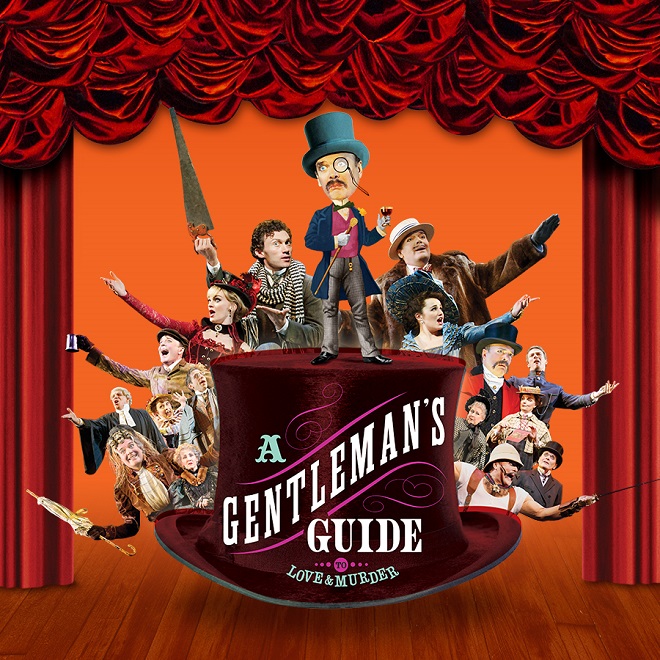After zig-zagging back and forth across the US the last few years, the Tony Award-winning musical A Gentleman's Guide to Love & Murder is finally making its Los Angeles debut now through May 1st at the Ahmanson Theatre. It was first performed at Connecticut's Hartford Stage and was then finessed at the Old Globe in San Diego before premiering on Broadway, where it won Tonys for Best Musical, Direction of a Musical, Best Book of a Musical and Costume Design.
This gleefully black comedy concerns the efforts of a young lower-class Englishman, Monty Navarro (charmingly played by Kevin Massey), to ascend to the top of early 20th-century British society by offing the members of the upper-class D'Ysquith family, of which he learns his mother was a cast-off descendant. While some of the snooty D'Ysquiths end up succumbing more accidentally or as the result of natural causes, Monty resorts to murder via drowning, crushing, shooting and engineered bee attack in other cases. Meanwhile, Monty is torn between his romantic feelings for two different women: the seductive Sibella (Kristen Beth Williams) and his sweet but ditzy D'Ysquith cousin, Phoebe (Adrienne Eller).
The musical was inspired by Roy Horniman's novel Israel Rank, which also served as the source for 1949's film classic Kind Hearts and Coronets. The movie is best remembered for casting Alec Guinness as all eight members/victims (both male and female), there named the D'Ascoynes. In keeping with this inspired element, A Gentleman's Guide to Love & Murder has one actor playing all the D'Ysquiths. John Rapson has taken over for the current tour from the incomparable, Tony-nominated Jefferson Mays. While funny and as adept at the many quick costume changes as Mays was, Rapson doesn't differentiate between the characters quite as well. The result is that several of them sound or act identical despite the differences in their appearance. His hilarious turn as the globe-trotting, self-serving philanthropist Lady Hyacinth is a notable exception to this.
Williams and Eller are both lyrical and lovely as Monty's paramours, who find themselves in increased competition with each other as the story progresses but eventually unite to support Monty when he is arrested for one murder he had nothing to do with. The relatively small supporting cast (an additional benefit when you have one actor playing eight roles) is excellent and was in great voice opening night. Also of note is this musical's unique, small-scale chamber orchestra, which beautifully underscores the droll score by Steven Lutvak and Robert L. Freedman.
Director Darko Tresnjak piles an abundance of comedic schtick onto the touring production, to its detriment. The musical is best as a darkly funny but perceptive social critique. Excessive mugging and prancing by Rapson and others distracts from this. Technically, the show is a colorful, projection-enhanced marvel. While it isn't as finely-tuned as it should be dramatically or comedically, it won't kill one to see A Gentleman's Guide to Love & Murder in its current incarnation.
Reverend's Rating: B
Review by Rev. Chris Carpenter, resident film and stage critic of Movie Dearest and Rage Monthly Magazine.













